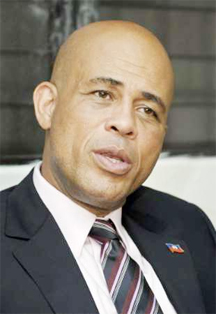CARACOL, Haiti, (Reuters) – Haiti and its international partners broke ground on Monday on a $257 million industrial park that represents the largest foreign investment since the Caribbean nation was hit by a catastrophic earthquake nearly two years ago.

The 608-acre (246-hectare) Caracol Industrial Park on Haiti’s northwest coast will be anchored by a South Korean textile firm, Sae-A Trading Co Ltd, which has committed to hire 20,000 people. That would make it the largest private employer in the Western Hemisphere’s poorest nation.
Haitian President Michel Martelly said the park could eventually provide jobs for 65,000 workers, which would increase Haiti’s garment industry workforce by more than 200 percent.
Martelly thanked international donors for helping provide food and water to homeless Haitians living in tents in the aftermath of the January 2010 earthquake that wrecked parts of the capital and killed as many as 300,000 people.
“We thank them for that, but that should change. Today, here is the model of investment Haitians need from the friends of Haiti,” Martelly said.
“This model of investment will allow Haitians to feel proud. They go to work, they get their salary and they will buy their own food and water.”
Sae-A is investing $78 million in the initial phase of the project, while the U.S. government is contributing $124 million and the Inter-American Development Bank $55 million.
Haiti’s government contributed the land for the industrial park in Caracol, about 15 miles (25 km) from the port city of Cap Haitien.
The first operations are set to begin in March. The project will include development of roads, an electricity-generating facility and housing.
Sae-A is a major supplier to U.S. retailers such as Wal-Mart Stores Inc, Target Corp, and Gap Inc. Promoters of the project say it could revive Haiti’s garment industry and are hoping to attract other clothing manufacturers that might benefit from increased American trade preferences for Haitian-made apparel.
The Haitian government is courting additional tenants in the textile industry as well as electronics and furniture manufacturers.
Former U.S. President Bill Clinton, a U.N. Special Envoy to Haiti, attended the groundbreaking ceremony with other potential investors.
“The Haitian government has offered real incentives to get people to come here and I thank all the business leaders who are with us today,” Clinton said.
“This industrial park is the result of people working together. Haiti is open for business because people are working together.”
Supporters have high hopes for the project. Clinton said that for every job created in the park, one new job would be created in the local economy.
The IDB said the project would create more than $500 million in wages and benefits over a decade, with each worker earning more than three times Haiti’s per capita GDP of $2,400.
It said the initiative would increase the number of jobs in the formal private sector by at least 20 percent.




